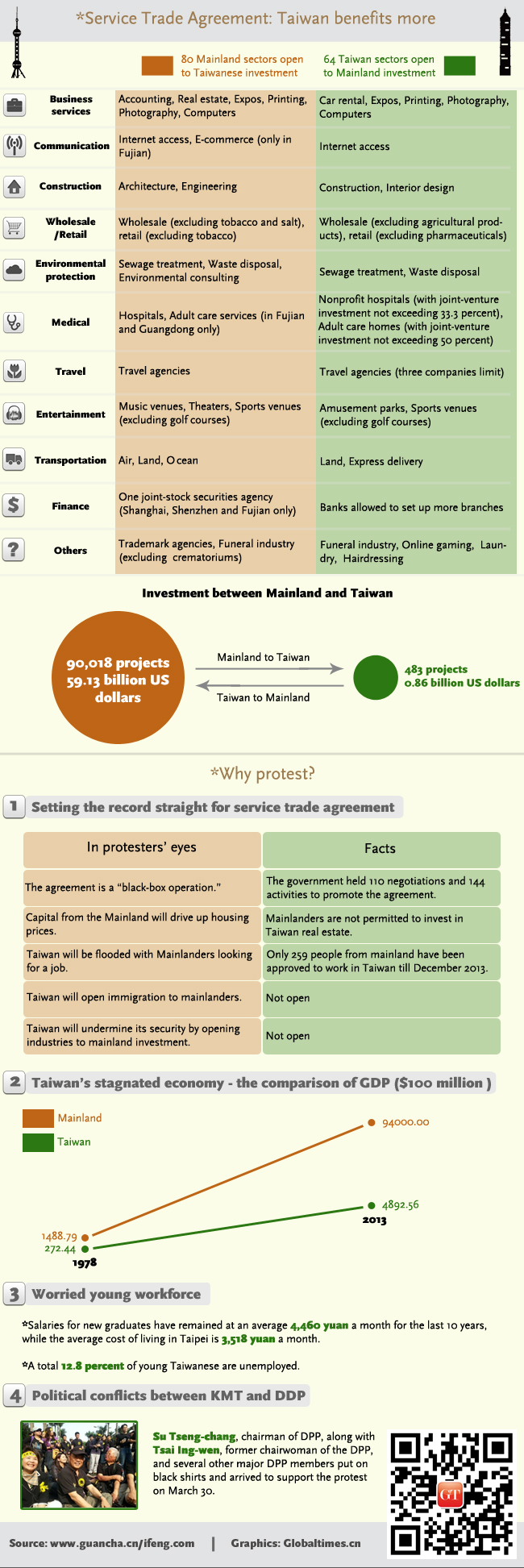HOME >>
Mass protests grip Taiwan over cross-Straits trade pact
Source:Globaltimes.cn Published: 2014-3-31 16:28:00
| Latest News |
Protests blot Taiwan image
Thousands of protesters on March 30 took to the streets in Taipei in renewed protest against a cross-Straits service trade agreement, amid an ongoing student campaign that paralyzed Taiwan's legislative authority.
Taiwan's Ma Ying-jeou against withdrawal of trade pact
Taiwan leader Ma Ying-jeou said on March 29 evening that he agreed the clause-by-clause review and vote on a cross-Strait service trade pact but is against withdrawal of the agreement.
Possible failure of cross-Straits pact upsets mainland negotiator
The mainland's chief negotiator Chen Deming would be deeply regretful if a cross-Straits service trade pact is not passed in Taiwan.
| Timeline |
●March 30 - Thousands of people flocked to streets in Taipei in protest against the cross-Straits service trade pact.
●March 23 - Students and members of the public stormed into the building of Taiwan's administrative authority.
●March 22 - A negotiation between protesting students and Jiang Yi-huah, chief of Taiwan's administrative authority, failed.
●March 19 - Students continued sitting on the podium of the assembly hall, delivering speeches and shouting slogans.
●March 18 - Hundreds of people, mostly university students, entered the main assembly hall inside the Legislative Yuan in Taipei.
| Graphics |

| Opinions |
| Counter Voices | |
| ●"Taiwan is in urgent need of more free trade agreements as its economy relies heavily on foreign trade and failure to pass the trade agreement would not only damage Taiwan's credentials in the world but also hurt cross-Straits relations." - Taiwan leader Ma Ying-jeou ●"Economic cooperation with Taiwan will benefit people on both sides, but especially Taiwan residents." - Ma Xiaoguang, spokesperson for the Taiwan Affairs Office (TAO) of the State Council |
●"Although the agreement might benefit Taiwan's economy in the short term, our independent economy may be put under control of the mainland in return. It also risks all kinds of hidden rules and administrative approvals from the mainland." - Hong Chih-kun, a member of the Democratic Progressive Party central executive committee ●"As our leader, Ma should listen to public opinion instead of following suggestions from a few officials. Only those with vested interests would support the agreement. I am here to show my support to our campaign so that Taiwan will not be economically controlled by the mainland." - Chiang Kun-hung, a 33-year-old protester |
Comments:
Student movement holds back Taiwan
This misconception cannot be sustained. If Taiwan students are fearful of change, they will only resort to what students in Egypt and Thailand have done, in which case Taiwan's future will be unclear.
Taiwan's student movement will not hurt the interests of the mainland. The movement is taking place under democratic conditions, but deals a heavy blow to Taiwan's rule of law.
Trade protest shames Taiwan democracy
Taiwan has been reminded of the crises in Thailand and Ukraine. But in a society where interests and stances are divided and in conflict, it is not known if such warnings will be of any use.
The mainland has been dedicated to promoting Taiwan's development to bridge the gap between the two sides. But we needn't be too effusive. The mainland should keep its dignity and reservation as an economic giant.
Taiwan's embittered students unfairly target cross-Straits trade pact
As a relatively naïve group, students are easily utilized by the pro-independence DPP. The general public is usually quite tolerant toward students and tends not to associate them with politics. This partly explains why radical pro-independence supporters have chosen students to lead the "occupy" movement.
In favor of economic opening-up and liberalization, the majority of people on the island expect Taiwan to integrate itself with other societies.
Web editor: yangruoyu@globaltimes.com.cn
Posted in: